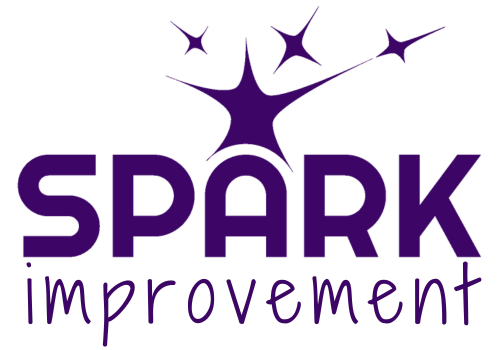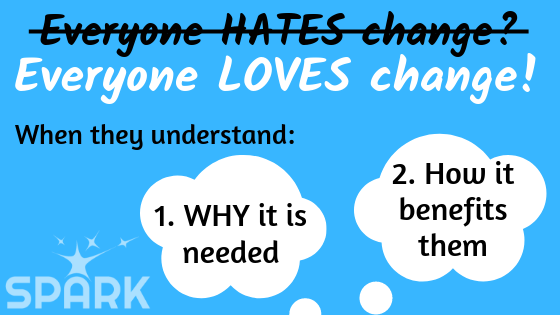Everyone HATES change! Right?
This is something I hear all the time.
And I bet you do too if you are a Continuous Improvement Manager, or someone involved in Change Management.
I think it’s a kind of mantra that people recite to make sense of why it’s so hard.
‘Everyone hates change!’
Nope. I’m calling BS on this one.
I believe this is a myth, spread in an effort to try and justify why change can be difficult. And stressful. And emotional.
And change often IS difficult and stressful and emotional. If it isn’t managed well.
I do believe that people ‘hate change’ if they don’t understand it and they don’t feel that it benefits them.
Let’s imagine you have a holiday booked. To a resort you know well, and that you love going to.
The travel agent emails you and tells you that your booking has changed to a different resort. Somewhere you don’t know. A different country, different culture, different climate.
You have to accept the change or cancel the whole thing.
Are you happy?
I’d guess not. This change has been forced upon you. No discussion, no explanation, no involvement from you. You don’t know anything about the new location, what it will be like. You would be pretty annoyed.
And let’s imagine that the change is actually a good thing. That the new resort is far better. That it is a country you have never been to. That you are going to get far better value for money because of this change. That you would have amazing experiences.
But you don’t understand that.
You don’t see that this change is actually a great thing. You are so wrapped up in feeling (rightly) cross and upset about the change that has been made, that you cannot see clearly enough to ask for or listen to the detail.
Maybe when you’ve calmed down you go back and ask for an explanation and discuss the changes and realise the benefits.
Or maybe you are so indignant that you cancel the whole thing.
This is a silly example, about an imaginary holiday to an imaginary resort. But I think it illustrates the importance of engagement.
If the right people aren’t made to feel involved in decisions that affect their work – their department, their environment, their process, their day – then they can just be left feeling that change has been forced on them.
That their opinion does not matter.
That THEY don’t matter.
Sometimes people just cannot see past that.
However, if those people feel they have had a voice – that they have been involved, that people care about them – then they will always be more open.
Of course, sometimes decisions do need to be made by others. Change may have to happen without consultation or discussion. Often you simply cannot involve everyone in the choices or design of some change. But in those cases, the onus is on communicating the ‘why’.
If people understand why something has to change, if they understand the thought processes and the decisions that led to the change, and they can see the subsequent benefits to them, then they are far more likely to embrace it.
Imagine you had a phone call from the travel agent explaining that the 4-star resort you had booked at is having major unexpected building work, and now your room is not available in July. So the travel company would like to move your holiday to a new all-inclusive 5-star resort, in a different country that actually you have wanted to go to for years.
Different scenario now.
You understand why the change is happening, you are clear on what it means for you, and that it IS better for you.
I bet you’d bite their hand off.
I’m not pretending this is easy. But please, please, don’t utter those awful three words – ‘Everyone hates change!’ as an excuse as to why change is proving difficult. Or why people are reacting in a certain way.
Instead think about who has been involved, whether the right people are engaged, and how the change has been communicated.
Because, you know what? People LOVE change, when they understand why it’s needed and when they know how it benefits them.
Does this resonate with you? Do you find yourself saying ‘Everyone hates change’ when things get tough?
Or do you, like me, get mad when you hear others saying it?
Please let me know in the comments.





